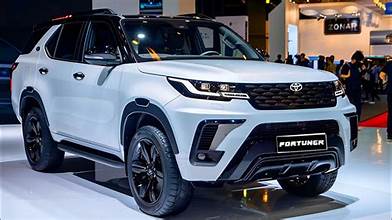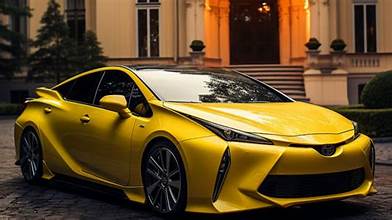Call it bold marketing or a cheeky reframe: the 2025 Toyota Fortuner takes the compact-effortless spirit people expect from a modern hatchback — easy daily use, clever packaging, comfortable cabin — and stretches it into a large, capable SUV that still feels friendly and urbane. The Fortuner has always been Toyota’s ladder-frame, family-and-adventure workhorse; the 2025 Turbo-equipped lineup pushes that idea further by pairing refined on-road manners with genuine torque-rich power for towing and rough roads. Below I unpack what makes the 2025 Fortuner Turbo noteworthy, show full spec/price tables, and break down features and real-world strengths.
Quick highlights
- Rugged ladder-frame SUV with refined on-road manners (reimagined here as “hatchback ease” at SUV scale).
- Turbocharged diesel option available in many markets (popular 2.8L turbo-diesel in select trims) plus mild-hybrid variants in some regions.
- Comfortable, modern cabin with new tech (larger screens, 360° camera, wireless charging on higher trims).
Key specifications (compact table)
| Item | Detail |
|---|---|
| Platform | Ladder-frame body-on-frame SUV |
| Typical engine choices | Turbo-diesel (commonly 2.8L turbo-diesel in many markets); 2.4L diesel / mild-hybrid options also offered in some regions. |
| Transmission | 6- or 8-speed automatic (varies by market) |
| Drivetrain | 2WD and 4WD options |
| Seating | 7-seater (2-3-2) with optional captain chairs on mid/high trims |
| Infotainment | Large central touchscreen, smartphone mirroring, wireless charging (higher trims). |
| Safety tech | Multiple airbags, ESC, hill-start assist, optional 360° camera and advanced driver assists. |
| Typical use case | Family daily driver + off-road capability / towing |
Note: exact engine, gearbox, and kit vary by country and trim — check local dealer specs for precise numbers.

Price table — representative market SRPs (examples)
Prices below are market examples for 2025 Fortuner variants (regional SRP / ex-showroom where noted). They show typical range rather than a single global MSRP — local taxes, import duties, and promos affect final on-road price. Sources listed per row.
| Market | Representative 2025 price (indicative) | Source |
|---|---|---|
| UAE | From AED 128,900 (manufacturer SRP shown on Toyota UAE site). | |
| Thailand | ~฿1,643,000 — ฿1,904,000 (Legender range shown for 2025). | |
| Australia | A$53k–A$66k (marketed ranges for 2025 GXL/GX). | |
| Pakistan | PKR ~14.9M (base) to PKR ~20.5M (top GR-S trim) — dealer listings/aggregators. | |
| Typical global/US equivalent | Roughly US$42k–$55k for base → high-spec models (illustrative cross-market range). |
Design & packaging — “hatchback thinking” at SUV scale
The Fortuner’s 2025 styling keeps its bold SUV character — high bonnet, strong shoulder lines, and squared-off wheel arches — but the interior layout borrows the friendly simplicity of modern small cars: logical switchgear, minimal clutter around the driver, and a UX that prioritises everyday convenience. That’s the heart of the “modern hatchback redefined” idea: bring familiar, easy usability to a larger package so owners don’t feel lost in complexity.
Practical touches you’ll notice: wide door openings for easy child-seat access, low-ish floor step for an SUV, numerous cubbies, and a configurable cargo bay with a flat load floor when the third row is folded.
Comfort, technology & cabin features
Top trims step up with premium seats (leather or leatherette), power-adjustable driver seats, multi-zone climate control, and a bigger infotainment display with wireless Apple CarPlay / Android Auto. Toyota added helpful features such as a 360° camera and wireless phone charging to make city parking and daily commutes far less stressful. These items are standard or optional depending on the market and trim.

Performance — the “Turbo” story (practical emphasis)
Across many markets the Fortuner’s turbocharged diesel option (commonly a 2.8L in higher trims) is prized for its low-end torque: that means confident overtakes on highways, easier hill climbs, and towing grunt when you’re pulling a trailer or caravan. The ladder-frame chassis still prioritises durability and off-road geometry, so the Fortuner blends everyday drivability with genuine ability on loose surfaces.
If you’re coming from a hatchback you’ll immediately feel the Fortuner’s added mass and higher ride height — but modern suspension tuning and optional adaptive dampers (market-dependent) narrow the gap so city manners are not punishing.
Off-road & towing capability
The Fortuner remains a workhorse: selectable 4×4 systems, good ground clearance, and robust cooling and drivetrain packaging mean it can handle serious journeys. Tow ratings and 4×4 hardware vary by region, so check your local specification sheet if you plan to tow heavy loads.
Safety & driver aids
Toyota equips the Fortuner with a safe suite: multiple airbags, stability control, ABS with EBD, hill descent (in some models), and advanced driver aids on higher trims (lane-keep, adaptive cruise, autonomous emergency braking setups vary by market). These are increasingly common across the 2025 lineup.
Who this Fortuner is for
- Families who want SUV space and ruggedness but still expect everyday ease-of-use.
- Buyers who tow boats/campers and need torque and reliability.
- Drivers who value Toyota’s reputation for durability and resale.
It’s less for people who want sports-car handling; the Fortuner’s charm is capability and calm competence.
Final verdict — big SUV, small-car soul
Calling a Fortuner a “hatchback redefined” is a playful way of saying Toyota has made this big SUV behave like a friendly, usable family car while keeping the strength and versatility that buyers rely on. If you want a vehicle that’s comfortable for school runs, confident on highways, and ready for weekend off-road trips — with a turbocharged engine option to boot — the 2025 Fortuner Turbo packages that combination convincingly. Price, features and powertrains vary a lot by market, so use the price table above as a guide and confirm local on-road costs with your official dealer.



